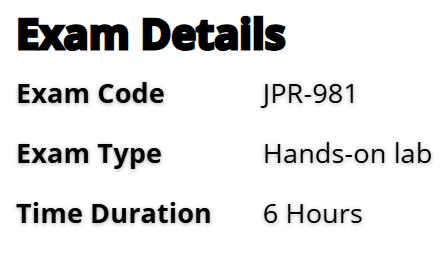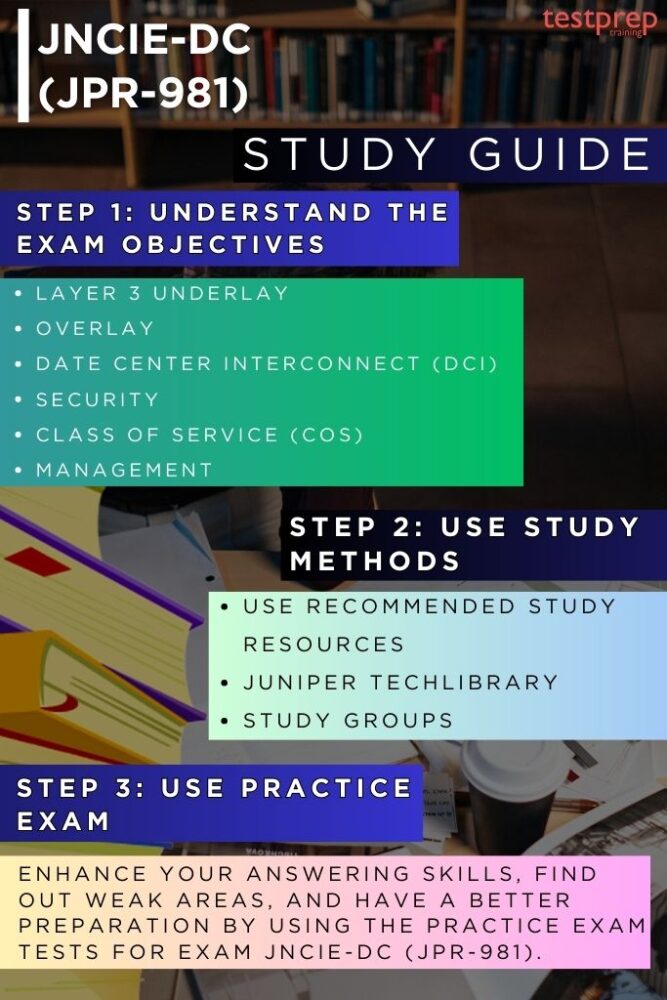JNCIE-DC (JPR-981)

The JNCIE-DC (Juniper Networks Certified Expert – Data Center) JPR-981 exam is a challenging 6-hour hands-on lab exam that validates your expert-level skills in deploying, configuring, managing, and troubleshooting Juniper’s Junos-based data center platforms. You’ll be tasked with building a complex data center network from scratch, using multiple MX Series routers and QFX Series switches. The exam assesses your ability to configure system settings, implement a Clos IP fabric, set up EVPN/VXLAN, establish Data Center Interconnect (DCI), and configure Class of Service (CoS) features.
This Data Center certification track showcases your expertise in advanced data center technologies, including configuration and troubleshooting. JNCIE-DC represents the highest level of achievement within this track. Essentially, this exam is designed to push your skills to the limit and ensure you can handle real-world data center scenarios with confidence.
Target Audience
The JNCIE-DC exam is designed for experienced networking professionals who specialize in data center technologies. This includes:
- Network Engineers
- Network Architects
- Senior Network Engineers
- Data Center Specialists
Knowledge Required
- In-depth understanding of networking concepts, protocols (TCP/IP, BGP, OSPF, etc.), and network architectures.
- Extensive knowledge of Juniper’s Junos OS, MX Series routers, and QFX Series switches.
- Expertise in data center networking concepts, including:
- Clos IP Fabric: Understanding and implementation of Clos network architectures.
- EVPN/VXLAN: Knowledge of Ethernet VPN (EVPN) and Virtual Extensible LAN (VXLAN) technologies for network virtualization.
- Data Center Interconnect (DCI): Ability to design and implement DCI solutions for connecting multiple data centers.
- Class of Service (CoS): Configuring and managing CoS features to prioritize different types of traffic.
- Layer 2 and Layer 3 Protocols: Proficiency in configuring and troubleshooting Layer 2 (Ethernet, VLANs) and Layer 3 (routing protocols) technologies.
- Security: Implementing security measures in data center networks, including firewalls, access control lists, and security policies.
- Ability to diagnose and resolve complex network issues in a data center environment.
- Significant practical experience in configuring, managing, and troubleshooting Juniper devices in a lab or production environment.
Exam Details

The JNCIE-DC (JPR-981) certification exam is an expert-level, hands-on lab assessment delivered by Juniper Networks to validate advanced data center networking skills. Candidates must hold the JNCIP-DC certification as a prerequisite. The six-hour practical exam tests the ability to design, configure, manage, and troubleshoot Junos-based data center environments. It utilizes software versions including vQFX Virtual Switch (21.3), vSRX Virtual Firewall (20.2), vMX Virtual Router (20.4), and Apstra (4.0.2). The exam is conducted exclusively in English, and certification remains valid for three years before requiring recertification.
Course Outline
The JNCIE-DC (JPR-981) certification exam covers the following topics:
Topic 1: Learn About Layer 3 Underlay
In a controller-less data center, a successful candidate will:
- Build, deploy, and troubleshoot an IP fabric
- Use routing policies to ensure that only required addresses are advertised
- Use all available links for forwarding traffic
In a data center managed by Juniper® Apstra software, a successful candidate will:
- Build, deploy, and troubleshoot an IP fabric
- Use routing policies to ensure that only required addresses are advertised
- Create and use custom tags
- Restrict all fabric device configurations to Apstra
- Use all available links for forwarding traffic
Topic 2: Understand Overlay
In a controllerless data center, a successful candidate will:
- Deploy, manage, and troubleshoot an EBGP- or IBGP- signaled EVPN-VXLAN overlay
- Establish communication between multihomed and single- homed end devices
- Create multiple separate Layer 2 and Layer 3 tenant environments
- Enable routing between different Layer 3 tenants
- Configure and optimize multicast communication
In a data center managed by Apstra, a successful candidate will:
- Deploy, manage, and troubleshoot an EBGP-signaled EVPN- VXLAN overlay
- Establish communication between multihomed and single-homed end devices
- Create multiple separate Layer 3 tenant environments
- Enable routing between different Layer 3 tenants
Topic 3: Data Center Interconnect (DCI)
A successful candidate will:
- Deploy, manage, and troubleshoot a DCI solution between a Juniper Apstra-managed data center and a controllerless data center using Type 2 or Type 5 EVPN routes to enable tenant communication between data centers without the use of Apstra configlets
- Deploy, manage, and troubleshoot a DCI solution between two controllerless data centers using seamless VXLAN-to-VXLAN stitching to enable tenant communication between data centers
- Identify incoming VXLAN virtual network identifier (VNI) information from an unmanaged preconfigured peer devices
Topic 4: Security
A successful candidate will:
- Deploy, manage, and troubleshoot security features that protect the data center infrastructure and edge device
- Restrict device access from unauthorized protocols and networks
- Monitor and log excessive traffic events
- Monitor and track various spanning-tree messages and take required actions according to the defined security requirements
Topic 5: Class of Service (CoS)
A successful candidate will:
- Configure and troubleshoot CoS settings for server traffic connected to leaf nodes
Topic 6: Management
A successful candidate will:
- Use tags and probes to track critical services and trigger Apstra anomalies when specific conditions are met or exceeded
- Create and use custom Apstra configlets
- Enable subsecond link failure detection using Bidirectional Forwarding Detection (BFD) between leaf and external devices
- Implement date and time synchronization for devices
- Configure local and remote system logging
- Enable streaming telemetry on custom ports
- Use SNMP monitoring in the data centers
Exam FAQs: JNCIE-DC (JPR-981)
Exam General Guidelines
Juniper Networks upholds high standards for JNCP certifications by implementing recertification criteria to ensure certified professionals maintain relevant skills. These criteria apply across all JNCP certification tracks and may be updated as needed.
To renew a certification, candidates must either pass an exam or complete a higher-level course within the same track. This renewal extends the validity of all lower-level active certifications within the track, as well as any other active Associate-level certifications.
Certification holders can monitor their status through CertMetrics and receive periodic email notifications regarding their certification status. It is their responsibility to keep both their certifications and contact details up to date.
All JNCP certifications remain valid for three years, after which they will expire if not renewed within the specified timeframe.
Study Guide for JNCIE-DC (JPR-981)

1. Understand Exam Objectives
The JNCIE-DC (JPR-981) certification exam is designed to assess an individual’s ability to design, implement, manage, and troubleshoot complex Junos-based data center networks. Candidates must demonstrate expertise in configuring and optimizing critical technologies such as Clos IP fabric, EVPN/VXLAN, data center interconnect (DCI), and Class of Service (CoS). The exam also evaluates proficiency in deploying vQFX, vSRX, vMX, and Apstra solutions within a data center environment. Since this is a hands-on, lab-based exam, applicants should have practical experience in working with MX Series and QFX Series devices. A thorough understanding of Junos automation, system management, and security features is essential to successfully achieve the JNCIE-DC certification.
2. Utilize Recommended Training
Juniper Networks offers recommended training to help candidates effectively prepare for the JNCIE-DC (JPR-981) certification exam. This includes:
– JNCIE-DC Certification Self-Study Bundle
The JNCIE-DC Certification Self-Study Bundle from Juniper Networks is a practical resource designed to help candidates develop the skills required to pass the JNCIE-DC lab exam. Structured around the official exam blueprint, this hands-on guide covers various technologies through expert-level configuration exercises with detailed solutions. While it provides technology overviews, it does not offer in-depth explanations of foundational topics like OSPF and BGP, as prerequisite knowledge is assumed. The workbook includes two full practice exams, allowing candidates to simulate the real JNCIE-DC lab environment. This guide is ideal for data center professionals and certified engineers seeking additional support in their preparation for this expert-level certification.
3. Use Juniper TechLibrary
The Juniper TechLibrary is a valuable resource for candidates preparing for the JNCIE-DC (JPR-981) exam. It provides comprehensive documentation on Junos OS, networking technologies, and configuration guides for MX Series, QFX Series, vQFX, vSRX, vMX, and Apstra solutions. Candidates can use the TechLibrary to clarify concepts, review command references, and explore troubleshooting techniques essential for the exam. Leveraging this official Juniper resource ensures a deeper understanding of data center networking, automation, security, and system management, enhancing overall exam readiness.
4. Join Study Groups
Engaging in study groups can significantly enhance preparation for the JNCIE-DC (JPR-981) exam. Collaborating with peers allows candidates to discuss complex topics, exchange troubleshooting strategies, and gain insights from experienced professionals. Study groups provide a platform to share resources, clarify doubts, and stay motivated throughout the certification journey. Additionally, interactive discussions can help reinforce key concepts and expose candidates to different approaches to problem-solving, ultimately improving their performance in the lab-based exam.
5. Take Practice Tests
Taking practice tests is crucial for assessing readiness and identifying areas that need improvement before attempting the JNCIE-DC exam. These tests simulate the real hands-on lab environment, allowing candidates to practice configuring Junos-based data center networks under exam-like conditions. By working through full-length practice exams, candidates can improve time management, refine troubleshooting skills, and gain confidence in handling complex configurations. Regular practice helps reinforce concepts and ensures a structured approach to exam preparation.



